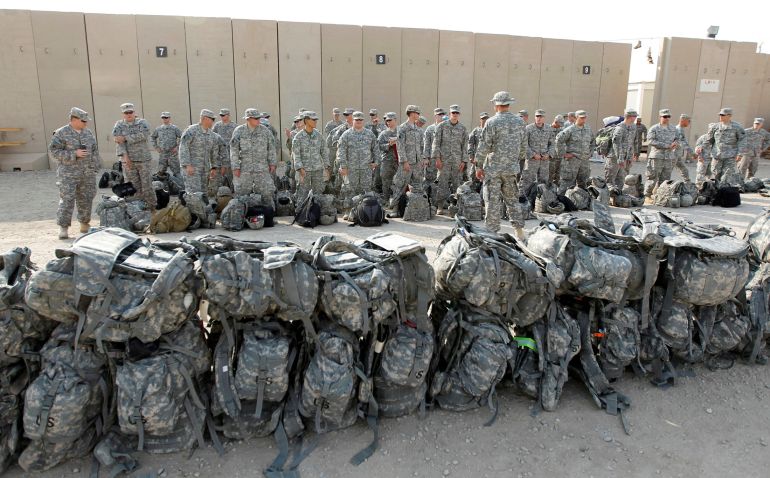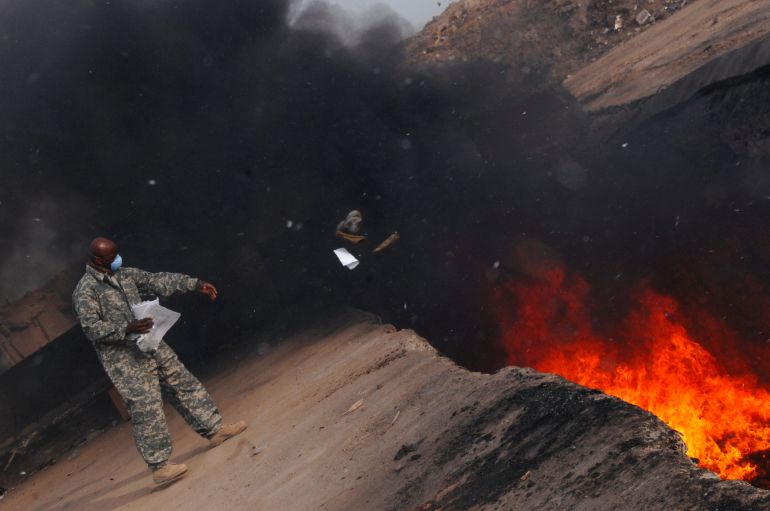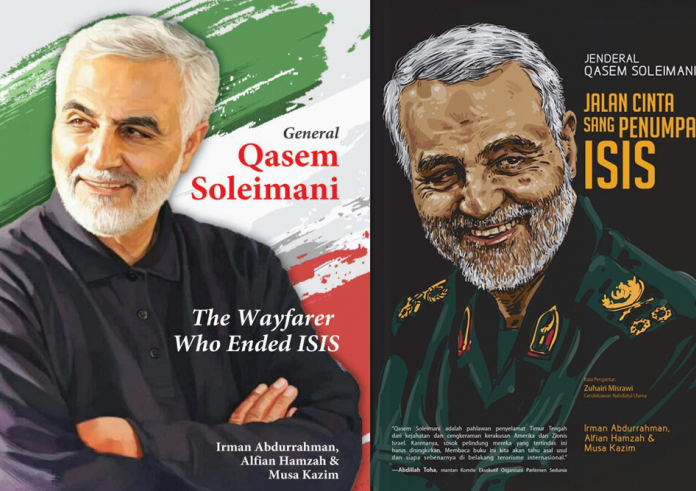By Brian Osgood

Naveed Shah crisscrossed Iraq during his time in the United States Army, travelling from the capital Baghdad to the southern city of Basrah, on the banks of the Shatt Al Arab river.
Like many recruits, he had been inspired to enlist after the attacks on September 11, 2001, that killed nearly 3,000 people in the US.
That day had left him rattled. Shah was only a teenager at the time, but he remembers the day two hijacked aeroplanes slammed into the World Trade Center in New York City, with a third hitting the Pentagon building in Washington, DC, not far from where he lived. A fourth hijacked plane, believed to also be headed to Washington, DC, crashed in a field in Pennsylvania after passengers fought back.
“I felt that my country was under attack,” Shah, who now works with the veterans’ advocacy group Common Defense, told Al Jazeera in a recent phone call. “And as a Muslim, I felt that my religion had been perverted to justify something terrible.”
Shah ultimately joined the army in 2006, nearly three years into the US invasion of Iraq. It was a campaign that then-President George W Bush justified by evoking the September 11 attacks, warning that Iraq was harbouring “terrorists” and developing weapons of mass destruction, a claim that has since been disproven.
Shah, like many Americans at the time, said that he did not second-guess the decision to invade.
“I didn’t think much about how we ended up in Iraq,” he said. “At the time it looked like we were winning and we were going to leave the country on decent footing.”
However, as the 20th anniversary of the Iraq war approaches, Shah’s views have changed. Many veterans like Shah now wrestle with questions about the invasion’s purpose, as well as lingering combat-related medical challenges.
“The war was based on a lie,” Shah said. “It was wrong for us to be there in the first place.”

Growing disapproval
Among the hundreds of thousands of US service members who took part in the Iraq war, perspectives about the conflict are varied.
“My year in Iraq was not pleasant,” Kristofer Goldsmith, who served in Iraq from January to December 2005, told Al Jazeera. “I can’t say any American, much less any Iraqi, is better off for me having served there.”
A 2019 poll by the Pew Research Center found that a sizable majority of US veterans — about 64 percent — believe that the Iraq war was not worth fighting, a rate slightly higher than the 62 percent of all US adults who agree with that statement.
In foreign policy circles, the war is increasingly described as a mistaken endeavour at best and, at worst, a conflict based on false pretences that brought death, destruction and instability to the region. Hundreds of thousands of Iraqi civilians died, and millions were displaced.
The years since the invasion have spurred Shah, who served as an army communications specialist during the war, to reconsider how the US approaches its foreign policy.
“It sounded far-fetched when people said that there was an effort at the highest levels of government to lie us into a war, but that’s what happened,” he said.
Shah would like to see an end to what he calls the “perpetual state of military activity” that has defined the US’s “war on terror”.
“The US defence budget is nearing $1 trillion. With all of the issues we have at home, should we be getting involved in conflicts all over the world?” he asked. “I think the clear answer is no.”

Channelling experience into advocacy
Another veteran, Oscar Olguin, lost his right leg due to an explosion early in the Iraq war, in 2003. He expressed ambivalence about the war and its legacy in a recent phone interview with Al Jazeera.
“I wouldn’t change anything that happened to me but I can’t say whether the war was worth it,” he said. “Is it ever really worth it? In a fight, nobody really wins.”
But like some Iraq war veterans, Olguin has found a way to channel his experience into advocacy work.
Through his job helping veterans access government services at the nonprofit Disabled American Veterans (DAV), Olguin said he has helped veterans of all ages and backgrounds, including a former Tuskegee airman, one of the Black fighter pilots who served during World War II. The work “feels gratifying”, Olguin explained.
Goldsmith, the veteran who served in Iraq in 2005, has also found a renewed sense of self through advocacy. He had been struggling with mental health issues during his enlistment.
“I remember my squad leader asked me if I had ever heard of PTSD,” he said, using an acronym for post-traumatic stress disorder. At the time, Goldsmith explained, “it wasn’t part of the lexicon”.
Goldsmith was ultimately discharged after attempting to take his own life. “When I left the military, I lost a big part of my identity, a big part of my community,” he said. But outreach work stateside helped him rediscover a sense of well-being: “Sharing my story and my experiences really helped me get out of a dark place.”
He has since founded a group called Task Force Butler, which focuses on identifying neo-Nazis through intelligence gathering on the internet.
“My experiences left an impact on me that can’t be separated from who I am,” Goldsmith said. “I used to think about the war constantly. Now, when I think about my identity as a vet, it’s about using my skills to make my country a better place and fighting for democracy here at home.”

Ongoing health impacts
Shane Liermann, who works on legislative issues with the DAV, credits Iraq war veterans with pushing the US government to expand services like healthcare and education for military personnel, past and present.
One of the most high-profile fights was over exposure to burn pits, used in both conflicts to dispose of waste on military bases. Advocates say plastics, electronics and even industrial chemicals were thrown into the rubbish fires, releasing toxic fumes and heavy metals.
But for years, the burden had been on veterans to prove that their health conditions were the result of their proximity to the pits.
Only in August 2022 did US President Joe Biden sign a bill expanding healthcare benefits for veterans exposed to toxins during their service, including from the burn pits in Iraq and Afghanistan.
“Thirteen thousand veteran claims had been denied since 2007,” said Liermann. “Under this bill, it’s no longer up to veterans to prove causation.”

He said that reforms to the GI Bill, a veterans benefits law, have also expanded college access. Other laws, like the Caregivers and Veterans Omnibus Health Services Act and the TEAM Veteran Caregivers Act, have helped provide veterans with disabilities receive assistance in their homes.
Still, Liermann noted, gaps in coverage persist, and some veterans struggle to access the help they need.
“Veterans in rural areas can still have a hard time accessing benefits,” he said. “If you have to drive a few hours to a VA [Veterans Affairs] clinic in a big city, that can be a challenge.”
Mental health issues remain a persistent concern: More than 6,000 veterans have died by suicide each year since 2001.
But that trend shows signs of improvement. According to a VA report released last year, the veteran suicide rate dropped by 9.7 percent between 2018 and 2020.
“There are more resources available now than there were before,” said Goldsmith, the veteran turned advocate. “There’s still work to do but things have gotten better.”
Source: Aljazeera

















